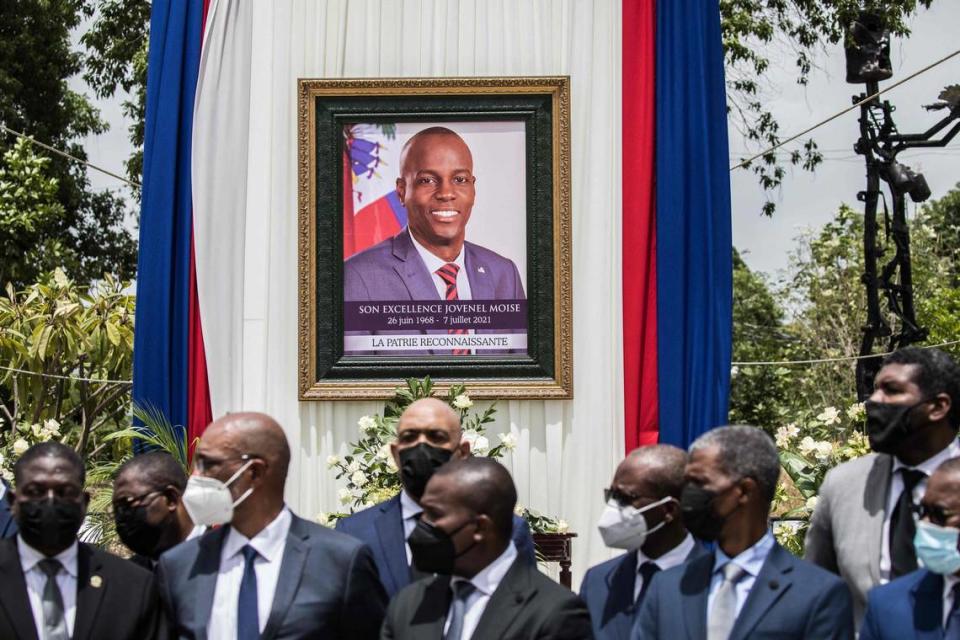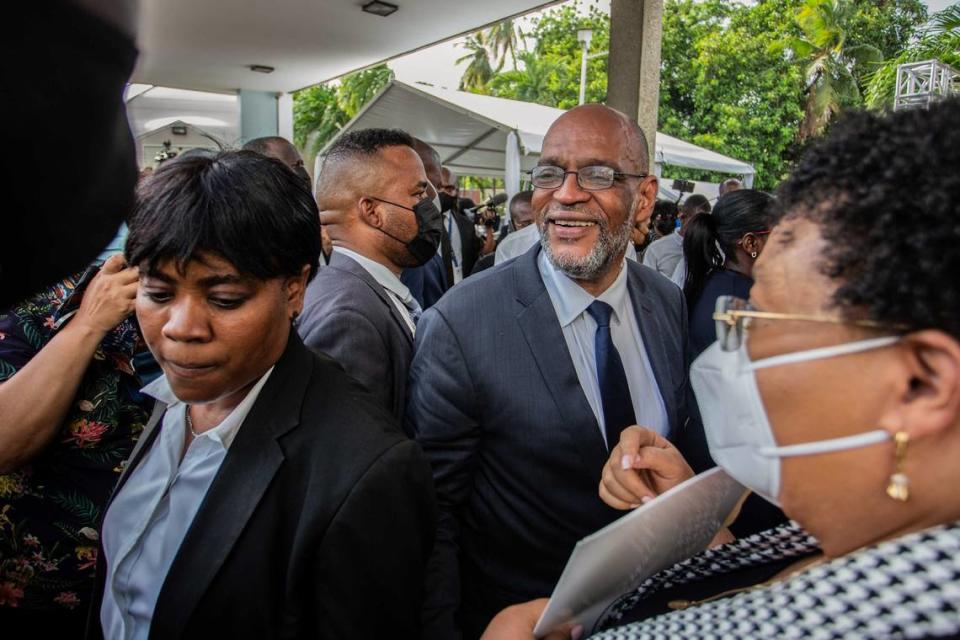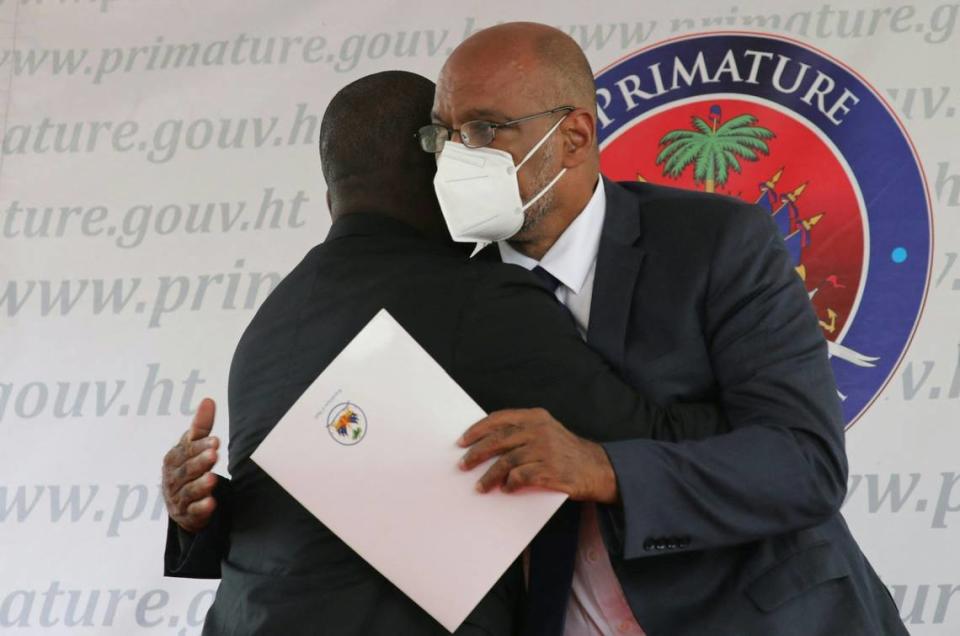Ariel Henry takes charge of Haiti as country continues investigation into president’s killing
- Oops!Something went wrong.Please try again later.
A public health expert who until recently earned his living as one of Haiti’s few neurosurgeons became its newest prime minister Tuesday, nearly two weeks after the brazen assassination of President Jovenel Moïse.
Dr. Ariel Henry, 71, was named prime minister by Moïse two days before his shocking July 7 slaying inside his private residence in the hills above Port-au-Prince. In the aftermath of the president’s death, Henry was plunged into the middle of a three-way power struggle over who should take control of the country.
That question ended Monday when Acting Prime Minister Claude Joseph announced that he was relinquishing power. He will remain in the new government as foreign minister.

Tuesday’s swearing-in of Henry coincided with the start of a series of public homages for Moïse ahead of his Friday burial. During the outdoor ceremony, not far from a gang-controlled kidnapping lair in downtown Port-au-Prince, Joseph welcomed Henry and wished him “courage” and “luck” in trying to steer Haiti through another tumultuous period in its history, which also involves the ongoing investigation of Moïse’s murder.
Political observers say Henry will need negotiating skills if the country is to get through its crippling political impasse and hold overdue elections for parliament, local offices and a new president before the end of this year.
“Unless the Haitians — members of civil society, political parties — are brought to the table to find a solution then nothing of significance is going to happen and it’s going to be the same thing,” said Alex Dupuy, a professor at Wesleyan University.
Dupuy said the interim government has to find a way to bring everyone to the table “to think about a logical solution to move forward.”
For him, that solution is elections.
“Without elections there could be no brighter future for Haiti, if that’s going to happen,” Dupuy said. “If the chaos continues, that may lead to another occupation by the United Nations, which may not be the best outcome for the country.”

While members of Haitian civil society say they are not opposed to elections, they take issue with the international community’s haste to hold them right away and say what Haiti needs “is a rupture” from the current administration. Under Moïse, institutions had refused to send representatives to sit on the nine-member Provisional Electoral Council, arguing that elections would not be fair, credible or transparent under him.
In an acceptance speech in French and Haitian-Creole, Henry appealed for frank and sincere dialogue among his fellow Haitians in order to end the crisis.
However, he warned Haitians that they shouldn’t think all of the country’s problems, which are many, will be resolved immediately.
“With collaboration,” he said, “we can realize good elections.”

As the latest person to take the helm of Haiti’s government, Henry faces a litany of challenges. The economy is in shambles, a political and constitutional crisis is deepening and gang violence remains a constant concern.
While the international community, which backed his nomination after initially supporting his predecessor, is pressing for elections, a divided opposition is pushing for a transition and seems unwilling to give him or the new government a chance.
“We have to reestablish trust,” Henry said. “We have to reestablish the authority of the state in all four corners of the country.”
Civic and political leaders, some of whom Henry once collaborated with, criticized his nomination because it was not the product of a political accord with the opposition but of Moïse’s own choosing. The criticism continued when the names of his cabinet members were released late Monday, and it was revealed that several ministers are holdovers from the previous government.
“It’s the same political plan that’s working,” said Velina Charlie, a member of the anti-corruption grassroots group Nou Pap Dòmi. “It’s continuity and the international community has the same agenda: elections as soon as possible.”
Leslie Voltaire, a former minister and member of the political party Fanmi Lavalas, said the current government will not break the ongoing political impasse, nor will it be able to take the country to elections before the end of the year.
“This is not an opening,” he said as he predicted the current interim government headed by Henry will be one “of many transitions in the transition.”
Prior to the swearing-in, Haiti Police Chief Léon Charles announced three additional arrests in the investigation to find out who bankrolled the president’s assassination. This brings the total number of arrests to 26, including 18 Colombians and two Haitian Americans.
Police also have in custody Christian Emmanuel Sanon, a South Florida-based Haitian doctor who was having meetings in Haiti about leading a transition government.
The justice ministry has also issued eight arrest warrants including for a former Haitian diplomat, Pierre Joseph Ashkard, who allegedly received the assassins at the airport. “The information we have on him is that he’s in the United States,” Charles said, adding that Haitian authorities have asked U.S. officials to help them locate him and bring him to justice.
There are also arrest warrants for a former senator, John Joël Joseph, and for Joseph Felix Badio, who worked in Haiti’s anti-corruption unit until he was dismissed earlier this year. Police have searched homes and hotels in the cases, and seized a cache of arms and ammunition.
The number of individuals taken into custody and placed in solitary confinement has also expanded from five to seven.
“We are working on finding the intellectual authors,” Charles said. “We are working on finding who gave money for this operation. We know that the operation was born out of the recruitment of Colombian military.”

